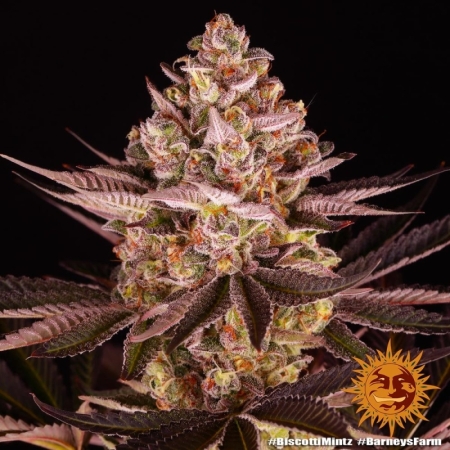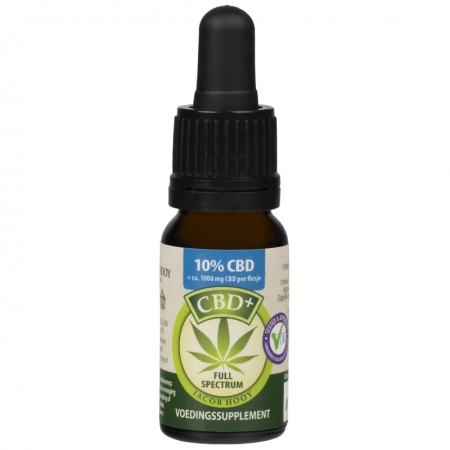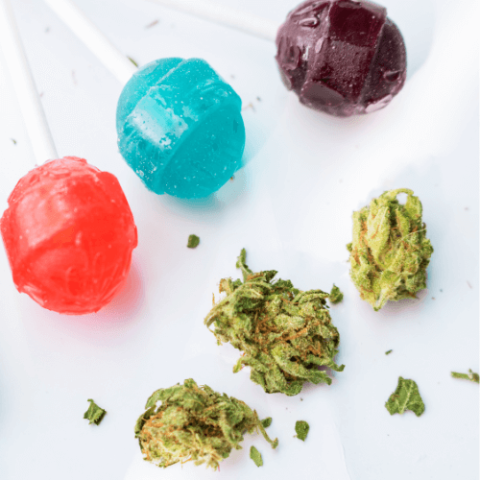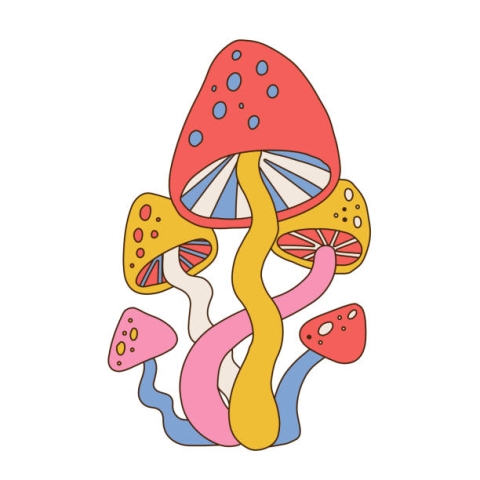Discover the effects of terpenes in cannabis and how they change your high
Terpenes in cannabis, what are they really? In this blog about terpenes, Gweedo takes you into the wonderful world of aromatic plant substances, which provide unique effects and influence being high. Like cannabinoids in weed, terpenes in weed also provide a unique effect of cannabis. You'll also learn about the entourage effect and the benefits of curing cannabis in this blog.
What are terpenes?
In a nutshell, terpenes are aromatic substances that determine the smell and taste of cannabis. They are not only found in our beloved plant. Terpenes are found in most trees, plants, mushrooms and fungi in our nature. There are also animals that make terpenes such as some termites, butterflies and caterpillars. The purpose of making these aromatic substances is to protect plants and animals by deterring their hunters. In plants, it is also simultaneously a mechanism to attract animals that prey on herbivores. Birds and insects are also attracted and thus transfer pollen to other plants. Terpenes are therefore extremely important for the survival mechanism of plants and animals. But also for humans. Because you don't eat or smoke something that is dirty. Cannabis for example smells and tastes very different before and during harvest than when it has been dried for a while.
The aromatic substance is volatile. Smells and tastes will change and fade over time. Cannabis smells and tastes very different before and during harvest, than when it has been dried for a while. This is because during and after harvesting, the life is out of the plant. The terpenes dissipate and the plant no longer creates new ones. This is why drying is an important part of growing flavorful cannabis. Something that is often underestimated.

Terpenes and cannabinoids
More and more attention is being paid to the substances CBD, THC and other cannabinoids. But at the moment not much is known about the therapeutic effects of terpenes in cannabis. More and more scientific studies are coming out suggesting that they play a major role. Cannabis can contain up to 200 different terpenes. These often differ greatly from one another and form different groups. For example, hemiterpenes, monoterpenes, diterpenes, sesquiterpenes and polyterpenes. All terpenes, including those outside of cannabis, are known to affect humans and animals when ingested. Increasingly, studies are showing that terpenes, together with cannabinoids and in certain proportions, have a very positive effect on patients and their illnesses. As a result, cannabis is increasingly being used medicinally and therapeutically. CBD and THC have been shown to have beneficial effects. These substances are therefore the basis of all medicinal cannabis products. But beyond CBD and THC, cannabis contains many other cannabinoids. And then again, the terpenes have a great effect on these.

The entourage effect
For example, it has been shown that a cannabis extract from which only one active ingredient has been isolated is less effective than if the extract contains all the substances of the cannabis. Think of it this way, you can take a pill for extra vitamin C. But eating an orange is better. This is called the entourage effect. Terpenes affect how cannabinoids interact with the receptors of our body's own cannabis system, the endocannabinoid system (ECS). Hence the importance of the entourage effect. Terpenes are produced on the still living plant and are very volatile. In addition, over time they will oxidize and change to another substance called, terpenoid. Terpenes and terpenoids are often confused with each other, but are 2 different substances.
Terpene Profile
The smell and taste of cannabis is becoming increasingly important to consumers. This is because consumption is becoming more pure these days. From a joint without tobacco to dabs with full melt extracts containing only active ingredients. Patients can benefit much more from one particular marijuana strain because of the terpenes present. Strains that smell and taste like fruit like melon, strawberry or banana. Or even like cookies, ice cream and other candy. This is called the terpene profile. Cannabis with a large and diverse terpene profile is becoming increasingly preferred.
Where we find terpenes
Trees, shrubs, plants, flowers, mushrooms, insects, etc. naturally produce terpenes. But they can also be found in cleaning products and air fresheners. Cosmetics, soaps and perfumes. Our weed, our cup of coffee or tea, you name it, terpenes are everywhere. The smell and aroma often determines whether we are attracted to a product or not. The same is true for cannabis.
Effect of terpenes on our body
Terpenes serve to protect plants from mold, disease and pests. In humans they can have a beneficial effect. Some examples of the effect of terpenes on our body.
- Muscle relaxant
- Antiseptic
- Positive effect on disorders
- expectorant
- Relaxing
- Anti-inflammatory
For thousands of years people have been making salves and tinctures for all sorts of ailments or for a little more balance in life. Many terpenes have been scientifically proven to work. And the basis of aromatherapy.
Common terpenes in cannabis
Several hundred types of terpenes have been found in cannabis. These are the most important and common ones:
-
Borneol, also known as Kamfol. It has a fresh camphor fragrance. The camphor tree, a large evergreen tree species from Asia, is known for this scent. Borneol is also found in coriander, sage, nutmeg and rosemary, among others. It is attributed a calming effect and is an important terpene in Chinese medicine. Borneol is often used for digestive problems and has a positive influence on blood circulation. It is applied in the treatment of hemorrhoids and is antiseptic. Whereby it helps in the healing of wounds.
-
Careen, or called Delta-3-careen, is a monoterpene with a penetrating sweet fragrance. Cypress oil, conifer oil, juniper oil are beneficial oils that contain careen. In high concentrations, careen can suppress the central nervous system and then affects responsiveness and acts as a muscle relaxant. It is often used to dry up excess body fluids such as tears, mucus and sweat. As a result, often incorporated into deodorant. And it explains, among other things, the dry mouth and dry eyes when consuming cannabis. Careen is not toxic, but is partly responsible for coughing and an itchy throat when smoking cannabis.Delta-3-careen is also naturally present in pine extract, paprika, basil oil and in citrus oil from fruits such as grapefruit, lemons, limes, tangerines, clementines, oranges and kumquats. Careen is a major constituent of turpentine and is used as a flavoring in many products.
-
Caryophyllene, also called beta-caryophyllene, is a macrocyclic sesquiterpene. It is a constituent of the essential oil of many plants, including oregano, ylang-ylang oil, clove oil, lavender oil and copaiba oil. Beta-Caryophyllene is found in a variety of plants. Among others, in the cannabis plant, basil, rosemary, cloves, hops, catnip, chamomile and black pepper. Caryophyllene is a substance with anti-inflammatory and analgesic effects. Studies show that it has many positive effects in the treatment of mental disorders such as addiction, eating disorders, parkinsonism and depression.
-
Eucalyptol is a monoterpene with a fresh smell. It is the main component of eucalyptus oil obtained from the leaves of the blue gum tree, Eucalyptus globulus. It is also found in the camphor tree and in aromatic herbs such as mint, basil, sage and thyme. Eucalyptol has a very fresh taste and reduces inflammation pain. Because of this, it is an important ingredient in mouthwashes. It loosens mucus in the airways and is therefore used in remedies for coughs and in the treatment of respiratory problems.
-
Phytol is a diterpene and a terpene also found on insects. They use it to deter predators. In a cannabis plant, Phytol is created during the breakdown of chlorophyll, the biological pigment of chlorophyll, the same is true of green tea. It has a jasmine-like scent that has a relaxing effect on humans and animals. The substance is widely used in various household products and cosmetics such as detergents, soaps, perfumes and shampoos.
-
Limonene has a citrus smell. And after mycene, limonene is the most common terpene in most cannabis strains. In addition, limonene is used as a natural, long-lasting solvent in cleaning products because it can dissolve oils. It can even dissolve petroleum and paint and is a good alternative to turpentine. Limonene is used in medicines for heartburn and for side effects of chemotherapy in cancer. It is also widely used in the soft drink and food industries.
-
Linalool is a monoterpene with a floral rose fragrance. You can find it in lavender, bergamot and rosewood, among others. Linalool has long been used in medicine, as a sleep aid. It also has an anti-inflammatory effect.
-
Myrcene is the terpene found in most cannabis strains. It is listed as one of the ten main terpenes of cannabis. Mycene provides the typical recognizable weed smell of most popular cannabis strains. It has an earthy, musk-like scent similar to clove. Mycreen is found in mango fruit, dill, hops and fennel. It gets its name from verbena myrcia, the West Indian laurel.
-
Nerolidol is also known as peruviol, a sesquiterpene found in the essential oils of many plant flowers and herbs. Its fragrance resembles forest air and tree bark. It is found in lavender, ginger, tea tree, lemongrass. jasmine, oranges and orange blossom. Another name for orange blossom is neroli, The terpene has a calming effect on the body and promotes a positive mood. Nerolidol also has a positive effect on the skin. It promotes the breakdown of old skin cells and stimulates the production of new skin cells, keeping the skin elastic and vital. Could this be the reason cannabis consumers maintain a younger look?
-
Pine is commonly found in conifers. Conifers pines and spruces. Pine is found in several forms in nature. An alpha form and a beta form, both are the main components of pine resin. Pineene is also found in pine nuts, in some citrus fruits and herbs such as ironweed and salvia. It is the most common terpene in nature. In medicine, it is used in anti-inflammatory, expectorant and as an antiseptic.
-
Sabinene is a monoterpene with a spicy aroma similar to pine and orange. Sabineen is found in many plants, including Norway spruce, black pepper, chamomile, basil, and Myristica fragrans (an evergreen plant native to the Moluccas) The seeds of the Myristica are the world's main source of nutmeg. In addition, the occurring terpene is also present in Juniperus sabina (seven tree) from which it gets its name. Sabinene has an anti-inflammatory effect.
Terpineol, a monoterpene with a pleasant sweet odor found in many flowers and herbs. Examples include aniseed, basil, mugwort, turmeric, ginger, geranium, gardenia, cinnamon, clove, bay leaf, oregano, parsley, lilac and thyme. The fragrance is widely used in organic pesticides. And essential oils containing this terpene are a base for many perfumes. Terpineol is known to suppress coughs and it works to dissolve mucus, allowing one to breathe more freely. It is widely used in medications for asthma patients Furthermore, it possesses antibacterial properties.
The benefits of terpenes in cannabis
Terpenes are everywhere and their presence is becoming increasingly important in the cannabis world. They protect their carriers and determine whether we are attracted to it or whether it deters us. What someone likes is very personal. Personally, I believe that a cannabis strain that someone likes is one where the variety of cannabinoids and the terpene profile are in a balance that is ideal for that consumer's body.
Did you enjoy reading this article and do you like to write yourself? We are always looking for people who share our passion for natural products, who can also translate this into great texts. And we have an interesting reward for this. View all information for writers.
Skunk 1
 Blog Microdosing
Microdosing with psilocybin according to the Stamets Stack Formula
Microdosing with psychedelics is a good exercise in subtlety, regularity and conscious awareness. Almost without thinking about it, certain patterns b [..]
15-11-2023
13 minutes
Blog Microdosing
Microdosing with psilocybin according to the Stamets Stack Formula
Microdosing with psychedelics is a good exercise in subtlety, regularity and conscious awareness. Almost without thinking about it, certain patterns b [..]
15-11-2023
13 minutes
 Blog Cannabis
Everything you need to know about weed edibles
If you've ever been to a stoner birthday party, you've probably come across them: edibles. As the word suggests, we're talking about edibl [..]
02-04-2023
8 minutes
Blog Cannabis
Everything you need to know about weed edibles
If you've ever been to a stoner birthday party, you've probably come across them: edibles. As the word suggests, we're talking about edibl [..]
02-04-2023
8 minutes
 Blog Magic Mushrooms
How many grams of magic truffles do you need to take? All about Mini-Dosing Truffles
The perfect dose of magic truffles to feel effect, how do you determine that? Mini-dosing magic truffles is all about finding the right ammount of psi [..]
Blog Magic Mushrooms
How many grams of magic truffles do you need to take? All about Mini-Dosing Truffles
The perfect dose of magic truffles to feel effect, how do you determine that? Mini-dosing magic truffles is all about finding the right ammount of psi [..]













 Nederlands
Nederlands Italiano
Italiano Deutsch
Deutsch Français
Français Português
Português Español
Español Polski
Polski